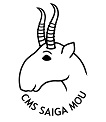Fact Sheet on Animal Culture and the Conservation of Migratory Species
What is Animal Culture?
Animal culture is defined as information or behaviours that are shared within a group or community and are acquired through social learning.1,2 The underlying processes of social learning can be defined as learning that is influenced by observation of, or interaction with, another animal or its products3 (e.g., tools or nests). Animal cultures can last across multiple generations, or can be ephemeral within a generation, like a ‘fad’. Social learning can influence how species forage, migrate and communicate. Social learning and culture have been identified across many vertebrate taxa.2 There is evidence for social learning from chimpanzees to sperm whales, passerine birds and storks, to coral reef fish. Beyond the genes inherited by offspring from their parents, the emergent understanding of how social learning and culture impact their characteristic traits and behaviour presents a new paradigm for the conservation of migratory species.

| Published Date | February 2024 |
|---|---|
| Publication Language | English French Spanish |
| Publisher | CMS Secretariat, Whale and Dolphin Conservation |
| Type | Fact Sheet |
| CMS Instrument | CMS |


